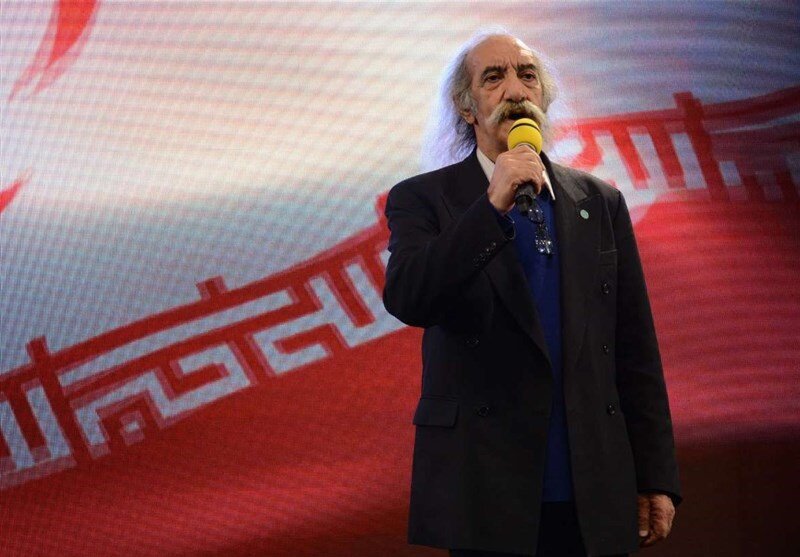AhlulBayt News Agency: Esfandiar Qarabaghi, the Iranian tenor who was most famous for his song “USA, USA, Shame on Your Deceits!”, died from an unspecified illness at his home in Tabriz on Thursday. He was 79.
He spent the last years of his life teaching at the Esfandiar Music Educational Center in his hometown Tabriz, where trained many Iranian singers, including Amir Tajik, Hamid Gholamali, Hamid Hami and Nima Masiha, Persian news websites reported.
His father was Qolikhan Salar, a wealthy landowner and a famous satirist in the Azarbaijan region. Due to his efforts to increase access to better education, he was sent to Tehran’s Badr High School.
After completing his education at the high school, he returned to Tabriz and entered a music academy. After graduation, he left Tabriz to pursue a teaching career in Kermanshah.
In 1968 in order to work with the Tehran Opera Company, he moved to Tehran, where he won a scholarship to an Italian university. After his return, he resumed working as a soloist at the company, collaborating in numerous performances.
He also worked with the National Choir of Persia and the National Iranian Radio and Television Choir. During this period he recorded “Ey Iran” (“O Iran”), a patriotic song composed by poet Hossein Golegolab and musician Ruhollah Khaleqi in 1941, when Iran was occupied after the Anglo-Soviet invasion. This song was first performed by Gholam-Hossein Banan.
After the victory of the Islamic Revolution, Qarabaghi began a collaboration with the Islamic Republic of Iran Broadcasting, producing revolutionary songs, the most famous of which was “USA, USA, Shame on Your Deceits!” produced in 1979 after the occupation of the U.S. Embassy in Tehran. The song was composed by Ahmad-Ali Ragheb based on a poem by Hamid Sabzevari.
In 2017, he was honored for his lifetime achievements by the 2nd International American Human Rights Festival, organized by the Art Bureau of the Islamic Ideology Dissemination Organization.
He was also decorated with prizes during some state festivals, which named him the “Voice of the Revolution”.
In his sympathy over the assassination of Lieutenant General Qassem Soleimani in 2020, Qarabaghi announced a plan to record songs in honor of the Quds Force chief. However, nothing was published about the plan later.
/129
He spent the last years of his life teaching at the Esfandiar Music Educational Center in his hometown Tabriz, where trained many Iranian singers, including Amir Tajik, Hamid Gholamali, Hamid Hami and Nima Masiha, Persian news websites reported.
His father was Qolikhan Salar, a wealthy landowner and a famous satirist in the Azarbaijan region. Due to his efforts to increase access to better education, he was sent to Tehran’s Badr High School.
After completing his education at the high school, he returned to Tabriz and entered a music academy. After graduation, he left Tabriz to pursue a teaching career in Kermanshah.
In 1968 in order to work with the Tehran Opera Company, he moved to Tehran, where he won a scholarship to an Italian university. After his return, he resumed working as a soloist at the company, collaborating in numerous performances.
He also worked with the National Choir of Persia and the National Iranian Radio and Television Choir. During this period he recorded “Ey Iran” (“O Iran”), a patriotic song composed by poet Hossein Golegolab and musician Ruhollah Khaleqi in 1941, when Iran was occupied after the Anglo-Soviet invasion. This song was first performed by Gholam-Hossein Banan.
After the victory of the Islamic Revolution, Qarabaghi began a collaboration with the Islamic Republic of Iran Broadcasting, producing revolutionary songs, the most famous of which was “USA, USA, Shame on Your Deceits!” produced in 1979 after the occupation of the U.S. Embassy in Tehran. The song was composed by Ahmad-Ali Ragheb based on a poem by Hamid Sabzevari.
In 2017, he was honored for his lifetime achievements by the 2nd International American Human Rights Festival, organized by the Art Bureau of the Islamic Ideology Dissemination Organization.
He was also decorated with prizes during some state festivals, which named him the “Voice of the Revolution”.
In his sympathy over the assassination of Lieutenant General Qassem Soleimani in 2020, Qarabaghi announced a plan to record songs in honor of the Quds Force chief. However, nothing was published about the plan later.
/129

